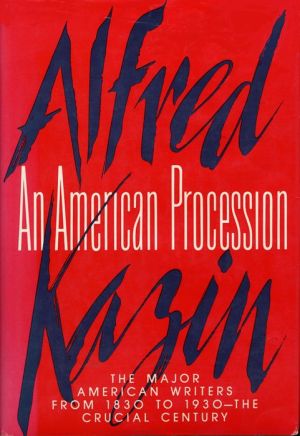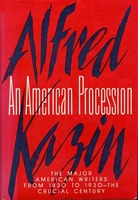- Welcome to FictionDB, Guest
- | My Account
- | Help

An American Procession — Alfred Kazin
An American Procession is a study, on the largest scale, of the major American writers at work during the historically and literarily crucial century that began in the early 1830s, when Ralph Waldo Emerson founded a national literature on the basis of a metaphysical revolution, and ended on the eve of the 1930s with the triumph of modernism and the critical recognition of the “postponed power” of those who had been modern before their time.
These one hundred years encompassed a period of unprecedented expansion and promise in the United States, and the work of our novelists, essayists, poets, and historians was the mirror of the nation's spirit. The thirty years preceding the Civil War produced the transcendental idealism of Emerson, Thoreau, and Whitman and the dark romanticism of Hawthorne, Poe, and Melville. In the years just after World War I, modernism reached its exemplary form in the work of Eliot, Pound, Hemingway, Dos Passos, and Fitzgerald, and between the two wars emerged the great realists: Mark Twain, Henry James, Crane, and Dreiser. It is through an exploration of the lives and works of these writers -- together with Emily Dickinson, William James, Henry Adams, and Faulkner -- that Kazin maps out a great literary procession shaped by individual genius, by history, and by the implacable American sense of self.
With each writer, Alfred Kazin illuminates for us the work, the influences that informed it, and its influence on the work of others. Each figure seems revitalized for us by Kazin's acuity and powerful sympathy for his subject. An American Procession, with its intellectual energy, its clarity and breadth, is the brilliantly executed capstone of Kazin's already illustrious career and will stand as the most important study of American literature in our time.
These one hundred years encompassed a period of unprecedented expansion and promise in the United States, and the work of our novelists, essayists, poets, and historians was the mirror of the nation's spirit. The thirty years preceding the Civil War produced the transcendental idealism of Emerson, Thoreau, and Whitman and the dark romanticism of Hawthorne, Poe, and Melville. In the years just after World War I, modernism reached its exemplary form in the work of Eliot, Pound, Hemingway, Dos Passos, and Fitzgerald, and between the two wars emerged the great realists: Mark Twain, Henry James, Crane, and Dreiser. It is through an exploration of the lives and works of these writers -- together with Emily Dickinson, William James, Henry Adams, and Faulkner -- that Kazin maps out a great literary procession shaped by individual genius, by history, and by the implacable American sense of self.
With each writer, Alfred Kazin illuminates for us the work, the influences that informed it, and its influence on the work of others. Each figure seems revitalized for us by Kazin's acuity and powerful sympathy for his subject. An American Procession, with its intellectual energy, its clarity and breadth, is the brilliantly executed capstone of Kazin's already illustrious career and will stand as the most important study of American literature in our time.
Genres
Sub-Genres
Click on any of the links above to see more books like this one.


